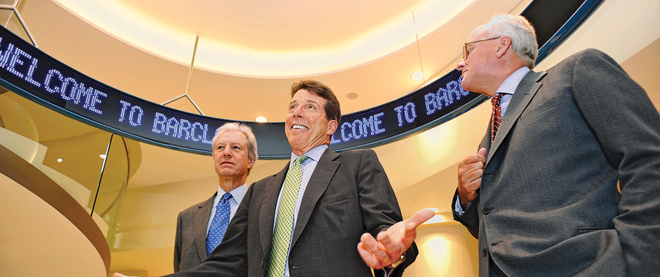The LIBOR scandal: It can’t just be bad apples
Bad systems convince good people they are doing good even when they are clearly doing the opposite
Dylan Martinez/Reuters
Share

Earlier this week, when American-born Barclays chief executive Bob Diamond finally stepped down in the wake of his bank’s interest-rate-rigging scandal, it was with characteristic defiance. “I am deeply disappointed that the impression created by the events announced last week about what Barclays and its people stand for could not be further from the truth,” he said. Not entirely surprising, given Diamond’s reputation for partisan toughness, though it’s interesting to wonder exactly which incongruous “truth” and “impression” he was referring to.
Here’s another truth: between the fall of 2007 and spring 2009, Barclays, one of Britain’s largest banks, found itself, like many other financial institutions, in dire straits. It was struggling to raise funds. Had it revealed it was paying higher-than-average interest rates, Barclays risked “reputational” damage and could have ended up being bailed out like the Royal Bank of Scotland or Lloyds Banking Group. Instead, its investment banking staff began subtly rigging the London interbank offered rate (LIBOR), an average interest rate estimated by the city’s leading banks of what they would be charged if borrowing from other banks. As the rate is calculated daily and underpins trillions of dollars of financial transactions, the habitual rigging had untold reverberations on the British economy as a whole. Last week, the scandal exploded as Barclays was fined $460 million by British and U.S. authorities for attempting to manipulate rates.
As for the impression? Here in the U.K., the Barclays scandal has been taken as a clear indication that the bank, and by extension the culture of finance in the city of London as a whole, is unacceptably corrupt. As governor of the Bank of England, Sir Mervyn King told media last week after yet another financial scandal came to light (this one involving improper selling of complex financial products to small businesses), “From excessive levels of compensation, to shoddy treatment of customers, to a deceitful manipulation of one of the most important interest rates, and now news of yet another mis-selling scandal, we can see we need a real change in the culture of the industry.”
It’s hard to understand how Diamond, whose resignation was applauded across the country and by the Chancellor of the Exchequer George Osborne as “the first step toward a new culture of responsibility in banking,” could possibly see his downfall as the result of false impressions. While it’s true the LIBOR investigation did not find him personally culpable, the buck must stop somewhere. On Monday, it appeared to have stopped with Barclays board chairman Marcus Agius, who tendered his own resignation. With Diamond’s departure on Tuesday, Agius is back and has taken over the running of the bank until a new chairman is appointed.
Diamond avoided the media after resigning, but both Diamond and Agius were called by the House treasury committee to be interrogated by MPs. In his resignation statement, Diamond—who never misses an opportunity to distance himself from the scandal—insisted he is looking forward to the opportunity to “contribute to the treasury committee’s enquiries related to the settlements that Barclays announced last week without my leadership in question.” Truth: I’m being forced to resign because the bank I was in charge of lied and cheated. Impression: actually, this whole thing hasn’t got much to do with me at all.
It’s exactly this attitude of moral impunity within the finance community that many British politicians and commentators are now insisting must be examined and redressed. While Prime Minister David Cameron has announced a swift and focused parliamentary inquiry into the LIBOR scandal, the Opposition are calling this solution a cop-out. Instead, Labour Leader Ed Miliband is demanding a full-scale public inquiry, like the one into media phone hacking, to uncover “institutional corruption” and to “find out what is going on in the dark corners of the banks.” This culture, Miliband has suggested, can only be rectified by the introduction of a stringent new code of conduct and criminal deterrents for bankers who break the rules.
But why is rule-breaking and number-fudging so rampant in the world of British high finance? The answer, a growing number of commentators are beginning to observe, cannot simply be a matter of “isolated rogue elements” at work in an essentially ethical corporation. Rather, the problem is institutional and systemic: bad systems convince good people they are doing good even when they are clearly doing the opposite. As the Irish finance journalist and author Fintan O’Toole recently wrote in the Observer, corrupt cultures “reward the compliant with tribal approbation and recast conscience as negativity. They invert altruism, using the instincts of decency . . . to normalize sociopathic behaviour and make decency despicable.”
Here in the U.K., the LIBOR rigging scandal at Barclays will have cultural and political consequences for many months to come. The BBC’s political editor Nick Robinson has said it is “to banking what the Milly Dowler case was to phone hacking.” But more than that, it stands as a warning to all corrupt systems in the country, financial, political or otherwise: fess up, clean up and learn to self-regulate or risk being disastrously exposed.